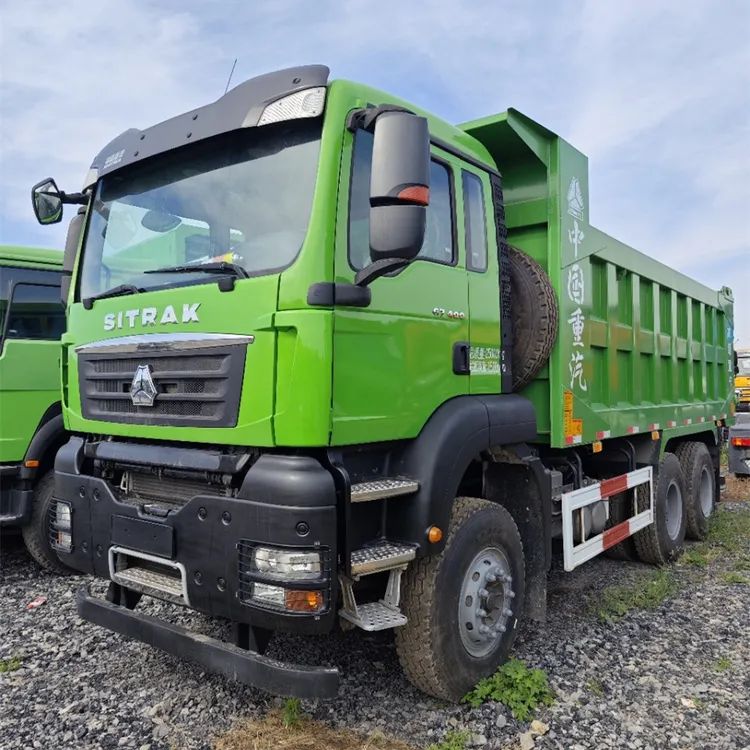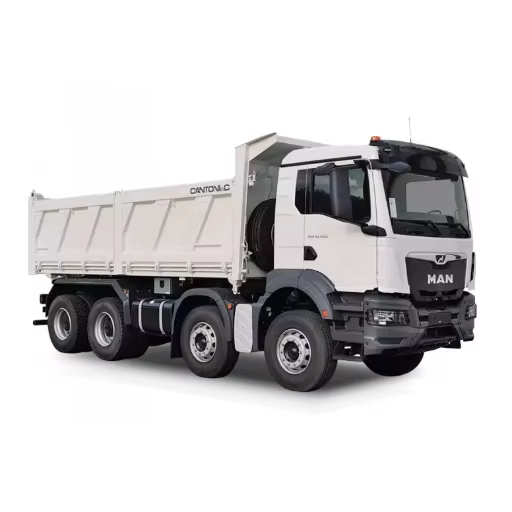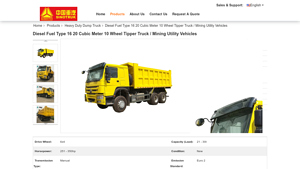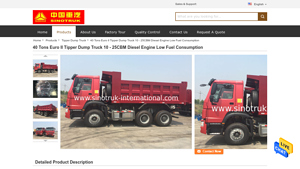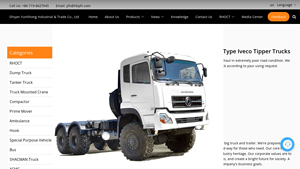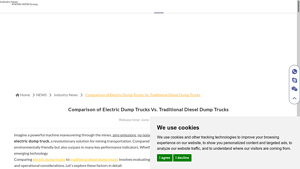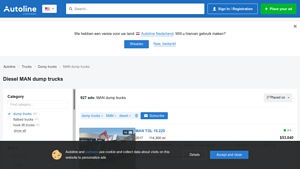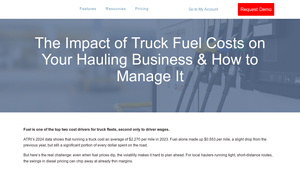Introduction: Navigating the Global Market for diesel Fuel Tipper Truck
In the dynamic landscape of international logistics, sourcing a reliable diesel fuel tipper truck can pose significant challenges for businesses aiming to optimize their operations. As industries ranging from construction to mining seek efficient solutions for transporting heavy materials, the demand for robust and dependable tipper trucks continues to rise. This comprehensive guide delves into the intricacies of the global market for diesel fuel tipper trucks, providing essential insights that empower B2B buyers to make informed purchasing decisions.
Within this guide, you will explore various types of diesel fuel tipper trucks, including specifications tailored to different applications and load capacities. We also cover critical factors such as supplier vetting processes, ensuring you select manufacturers that meet international quality standards. Additionally, the guide addresses cost considerations, helping you understand the financial implications associated with acquiring these vehicles.
By equipping yourself with this knowledge, particularly in the context of emerging markets in Africa, South America, the Middle East, and Europe, you can navigate the complexities of sourcing diesel fuel tipper trucks more effectively. Whether your operations are based in Saudi Arabia or Vietnam, this guide serves as a vital resource to enhance your procurement strategy, ensuring that you invest in vehicles that deliver optimal performance and reliability in demanding environments.
Understanding diesel Fuel Tipper Truck Types and Variations
| Type Name | Key Distinguishing Features | Primary B2B Applications | Brief Pros & Cons for Buyers |
|---|---|---|---|
| Standard Tipper Truck | 6×4 drive, 16-20 cubic meter capacity, manual transmission | Construction, mining, heavy materials transport | Pros: Versatile, robust, suitable for various terrains. Cons: May have higher fuel consumption. |
| Heavy-Duty Tipper Truck | 8×4 drive, 28-30 cubic meter capacity, reinforced body | Large construction projects, bulk material handling | Pros: High load capacity, durable. Cons: Higher initial investment and maintenance costs. |
| Mining Tipper Truck | Specialized for off-road conditions, high ground clearance | Mining operations, quarrying | Pros: Excellent traction, built for rugged terrain. Cons: Limited to specific applications. |
| Mini Tipper Truck | 4×2 drive, smaller capacity (up to 10 cubic meters) | Urban construction, landscaping | Pros: Maneuverable in tight spaces, lower operational costs. Cons: Limited load capacity. |
| Self-Loading Tipper Truck | Integrated loading mechanism, automatic tipping | Waste management, recycling, construction | Pros: Efficient loading and unloading, reduced labor costs. Cons: Higher complexity and potential for mechanical issues. |
What Are the Characteristics of Standard Tipper Trucks?
Standard tipper trucks are characterized by their 6×4 drive configuration and a capacity ranging from 16 to 20 cubic meters. These trucks are commonly used in construction and mining sectors for transporting heavy materials such as soil, gravel, and sand. When considering a purchase, buyers should evaluate factors such as load capacity, fuel efficiency, and the truck’s ability to navigate various terrains.
Why Choose Heavy-Duty Tipper Trucks for Large Projects?
Heavy-duty tipper trucks feature an 8×4 drive system and can carry between 28 to 30 cubic meters of material, making them ideal for large construction projects and bulk material handling. They are built with reinforced bodies to withstand the rigors of heavy loads. Buyers should consider the initial investment and ongoing maintenance costs against the benefits of high load capacities and durability.
How Are Mining Tipper Trucks Specialized for Rugged Conditions?
Mining tipper trucks are specifically designed for off-road conditions and feature high ground clearance for navigating rough terrains. These trucks excel in mining operations and quarrying, where traction and durability are paramount. B2B buyers should assess the truck’s performance in challenging environments and its suitability for specific mining applications.
What Are the Benefits of Mini Tipper Trucks for Urban Use?
Mini tipper trucks, with a 4×2 drive and a capacity of up to 10 cubic meters, are tailored for urban construction and landscaping projects. Their compact size allows for maneuverability in tight spaces, making them a practical choice for city environments. Buyers should weigh the advantages of lower operational costs against the limitations of their smaller load capacity.
Why Consider Self-Loading Tipper Trucks for Waste Management?
Self-loading tipper trucks come equipped with an integrated loading mechanism, allowing for automatic tipping, which enhances efficiency in waste management and recycling operations. While they can reduce labor costs and improve operational speed, potential buyers should be aware of the higher complexity and maintenance needs associated with these vehicles.
Key Industrial Applications of diesel Fuel Tipper Truck
| Industry/Sector | Specific Application of diesel Fuel Tipper Truck | Value/Benefit for the Business | Key Sourcing Considerations for this Application |
|---|---|---|---|
| Construction | Transporting aggregates, sand, and gravel to construction sites | Increases efficiency in material transport, reducing downtime | Load capacity, durability, and fuel efficiency are critical factors. |
| Mining | Hauling ores and minerals from mining sites | Enhances productivity and minimizes operational costs | Robustness, off-road capability, and maintenance support are essential. |
| Agriculture | Moving soil, fertilizers, and harvested crops | Streamlines farm operations and improves yield management | Versatility in load capacity and reliability in various terrains. |
| Waste Management | Collecting and transporting construction debris and waste materials | Supports environmental sustainability and compliance | Compliance with local regulations and efficient loading systems. |
| Oil & Gas | Transporting sand and gravel for hydraulic fracturing operations | Reduces logistical challenges and enhances project timelines | Engine power and fuel tank capacity to ensure long-haul operations. |
How is Diesel Fuel Tipper Truck Used in the Construction Industry?
In the construction sector, diesel fuel tipper trucks play a crucial role in transporting essential materials like aggregates, sand, and gravel directly to job sites. These trucks are designed to handle heavy loads and operate efficiently under demanding conditions, which helps to minimize downtime and increase productivity. For international buyers, particularly in regions like Africa and South America, sourcing trucks with high load capacities and robust structures is vital to ensure they can withstand the rigors of construction work.
What Role Does Diesel Fuel Tipper Truck Play in Mining Operations?
In mining, diesel fuel tipper trucks are essential for hauling ores and minerals from extraction sites to processing facilities. Their ability to navigate rugged terrains and carry significant loads makes them indispensable for mining operations. Buyers in the Middle East and Europe should prioritize trucks with strong engines and durable materials, ensuring they meet the specific demands of the mining industry while maintaining operational efficiency and cost-effectiveness.
How Can Diesel Fuel Tipper Truck Enhance Agricultural Efficiency?
In agriculture, diesel fuel tipper trucks are utilized for moving soil, fertilizers, and harvested crops. Their versatility allows farmers to streamline operations, improving the management of inputs and outputs. For B2B buyers in regions like Africa, where agricultural logistics can be challenging, selecting trucks that offer reliability and adaptability to various terrains is essential for maximizing productivity and yield.
Why are Diesel Fuel Tipper Trucks Important in Waste Management?
Diesel fuel tipper trucks are vital in the waste management sector, specifically for collecting and transporting construction debris and other waste materials. These trucks facilitate environmental sustainability by ensuring proper waste disposal and compliance with regulations. Buyers in regions with stringent waste management laws must consider trucks equipped with efficient loading systems and those compliant with local environmental standards.
How Does Diesel Fuel Tipper Truck Support the Oil & Gas Industry?
In the oil and gas sector, diesel fuel tipper trucks are used to transport sand and gravel for hydraulic fracturing operations. Their ability to handle heavy loads over long distances is crucial for project timelines and logistical efficiency. International buyers, especially in oil-rich regions like the Middle East, should focus on trucks with powerful engines and large fuel tanks to ensure they can manage extensive operations without frequent refueling.
3 Common User Pain Points for ‘diesel Fuel Tipper Truck’ & Their Solutions
Scenario 1: High Fuel Consumption Leading to Increased Operational Costs
The Problem: Many B2B buyers of diesel fuel tipper trucks face the significant challenge of high fuel consumption, which can dramatically inflate operational costs. In regions like Africa and South America, where fuel prices can be volatile, this issue becomes even more pressing. Buyers often find that the trucks they purchase are not fuel-efficient, leading to budget overruns and reduced profit margins. Additionally, fluctuating fuel prices can make it difficult for businesses to forecast expenses accurately.
The Solution: To mitigate high fuel consumption, it is crucial for buyers to prioritize the selection of fuel-efficient diesel tipper trucks. When sourcing these vehicles, buyers should focus on models equipped with advanced engine technologies, such as common rail direct injection and electronic control units that optimize fuel use. It’s also beneficial to look for trucks that feature lightweight materials and aerodynamic designs to enhance fuel efficiency. Regular maintenance, including timely oil changes and tire pressure checks, can also significantly improve fuel economy. Finally, consider implementing a telematics system to monitor fuel usage and driving behavior, allowing businesses to identify areas for improvement and reduce costs effectively.
Scenario 2: Difficulty in Finding Reliable Spare Parts and Service
The Problem: Another prevalent pain point for international buyers is the challenge of sourcing reliable spare parts and service for diesel fuel tipper trucks. In remote or developing regions, access to quality parts and skilled technicians can be limited, leading to prolonged downtimes when repairs are needed. This not only affects the operational efficiency of the fleet but can also result in substantial financial losses due to idle equipment.
The Solution: To ensure reliable access to spare parts and service, buyers should choose reputable manufacturers with a proven global supply chain and strong after-sales support. Before finalizing a purchase, it’s advisable to inquire about the availability of parts and the manufacturer’s commitment to providing service in the buyer’s region. Establishing a partnership with a local dealer who specializes in diesel fuel tipper trucks can also enhance support, ensuring quick access to necessary components and expert technicians. Furthermore, buyers should consider investing in training for local personnel to perform routine maintenance and minor repairs, minimizing dependency on external service providers and reducing downtime.
Scenario 3: Compliance with Local Emission Standards
The Problem: Compliance with local emission regulations poses a significant hurdle for many B2B buyers of diesel fuel tipper trucks, especially in regions where environmental regulations are becoming increasingly stringent. Buyers often find themselves in a dilemma: choosing a truck that is powerful enough for their needs while also meeting the required emission standards. Non-compliance can lead to hefty fines and damage to the company’s reputation, making it essential to navigate these regulations carefully.
The Solution: To address compliance issues, buyers should conduct thorough research on the emission standards applicable in their operating regions before purchasing a diesel tipper truck. Opting for models that meet or exceed local emission regulations—such as Euro II or higher—can help avoid future penalties. Engaging with manufacturers who provide detailed specifications on their trucks’ emissions performance will also aid in making informed decisions. Additionally, implementing regular emissions testing and maintenance practices can help ensure ongoing compliance. Buyers may also explore alternative fuel options or hybrid models that produce fewer emissions, aligning with both regulatory requirements and corporate sustainability goals.
Strategic Material Selection Guide for diesel Fuel Tipper Truck
What Are the Key Materials Used in Diesel Fuel Tipper Trucks?
When selecting materials for diesel fuel tipper trucks, it is essential to consider their properties, advantages, disadvantages, and how they align with the specific needs of international B2B buyers. Below, we analyze four common materials used in the construction of these vehicles: high-strength steel, aluminum, rubber, and composite materials.
High-Strength Steel: The Backbone of Structural Integrity
High-strength steel is commonly used in the chassis and dump body of diesel fuel tipper trucks. Its key properties include excellent tensile strength, durability, and resistance to deformation under heavy loads. This material can withstand high temperatures and pressures, making it suitable for demanding applications.
Pros: High-strength steel offers superior durability and impact resistance, ensuring the truck can handle rough terrains and heavy payloads. It is also cost-effective compared to alternative materials, making it a popular choice for manufacturers.
Cons: While it is strong, high-strength steel can be heavier than other materials, potentially affecting fuel efficiency. Additionally, it may require specialized manufacturing processes, increasing production complexity.
Impact on Application: High-strength steel is ideal for heavy-duty applications, particularly in mining and construction, where durability is paramount. However, it may require protective coatings to mitigate corrosion, especially in humid or saline environments.
Considerations for International Buyers: Buyers from regions like Africa and South America should ensure compliance with local standards, such as ASTM or DIN, for material quality. Additionally, understanding the local climate can influence the choice of protective coatings.
Aluminum: Lightweight and Corrosion-Resistant
Aluminum is increasingly used in the construction of tipper trucks, particularly for components like the dump body and fuel tanks. Its key properties include a high strength-to-weight ratio and excellent corrosion resistance, making it suitable for various environmental conditions.
Pros: The lightweight nature of aluminum improves fuel efficiency and payload capacity. Its resistance to corrosion reduces maintenance costs over time, making it an attractive option for long-term use.
Cons: Aluminum is generally more expensive than high-strength steel, which can affect the overall cost of the vehicle. Additionally, while it is strong, it may not withstand the same impact forces as steel, necessitating careful design considerations.
Impact on Application: Aluminum is particularly beneficial in regions with high humidity or saline conditions, as it resists rust and corrosion. However, its lower impact resistance may limit its use in extremely rugged applications.
Considerations for International Buyers: Buyers should consider the cost implications of aluminum and its compliance with international standards. In Europe and the Middle East, there may be specific regulations governing the use of aluminum in heavy-duty vehicles.
Rubber: Essential for Tires and Seals
Rubber is a critical material used in the tires and seals of diesel fuel tipper trucks. Its key properties include flexibility, resilience, and excellent wear resistance, making it suitable for various terrains.
Pros: Rubber tires provide superior traction and shock absorption, enhancing vehicle performance on uneven surfaces. Additionally, rubber seals prevent leaks in hydraulic systems, ensuring operational efficiency.
Cons: Rubber can degrade over time due to exposure to UV light and extreme temperatures, necessitating regular maintenance and replacement. Furthermore, the performance of rubber tires can be affected by load and inflation levels.
Impact on Application: The choice of rubber compounds can significantly impact the truck’s performance in different environments, such as muddy or rocky terrains. Proper tire selection is crucial for optimizing fuel efficiency and load capacity.
Considerations for International Buyers: Buyers in regions with extreme weather conditions should select rubber materials that are specifically designed for their climate. Compliance with international tire standards is also essential for safety.
Composite Materials: The Future of Lightweight Construction
Composite materials, often used in specialized applications, combine different materials to achieve superior properties. Their key properties include high strength, low weight, and resistance to corrosion and fatigue.
Pros: Composites can significantly reduce the weight of the vehicle, improving fuel efficiency and payload capacity. They also offer excellent resistance to environmental degradation, making them suitable for various climates.
Cons: The manufacturing processes for composites can be complex and expensive, potentially increasing the overall cost of the vehicle. Additionally, their repair can be more challenging compared to traditional materials.
Impact on Application: Composites are ideal for applications requiring weight reduction without compromising strength. They can be particularly advantageous in regions with strict emissions regulations, as lighter vehicles typically consume less fuel.
Considerations for International Buyers: Buyers should evaluate the cost-benefit ratio of using composite materials and ensure compliance with local regulations regarding material use in commercial vehicles.
Summary Table of Material Selection for Diesel Fuel Tipper Trucks
| Material | Typical Use Case for diesel Fuel Tipper Truck | Key Advantage | Key Disadvantage/Limitation | Relative Cost (Low/Med/High) |
|---|---|---|---|---|
| High-Strength Steel | Chassis and dump body | Superior durability and strength | Heavier than alternatives | Medium |
| Aluminum | Dump body and fuel tanks | Lightweight and corrosion-resistant | Higher cost than steel | High |
| Rubber | Tires and seals | Excellent traction and shock absorption | Degrades over time | Medium |
| Composite Materials | Specialized components | Reduces weight and enhances performance | Complex and expensive manufacturing | High |
This strategic material selection guide provides valuable insights for international B2B buyers looking to optimize their diesel fuel tipper truck purchases, ensuring they make informed decisions based on performance, cost, and regional compliance.
In-depth Look: Manufacturing Processes and Quality Assurance for diesel Fuel Tipper Truck
What Are the Key Stages in the Manufacturing Process of Diesel Fuel Tipper Trucks?
The manufacturing of diesel fuel tipper trucks involves several critical stages, each designed to ensure the vehicle meets the necessary performance and safety standards. The primary stages include material preparation, forming, assembly, and finishing.
How Is Material Prepared for Diesel Fuel Tipper Trucks?
Material preparation begins with sourcing high-quality raw materials, such as steel for the chassis and body, and advanced composites for the interior. Suppliers should adhere to strict international standards, ensuring that materials are durable and capable of withstanding harsh operating conditions. For instance, the steel used for the dump box must have a specific thickness to prevent deformation under heavy loads.
Once the materials are sourced, they undergo rigorous testing for structural integrity and durability. This is often done through non-destructive testing methods such as ultrasonic and magnetic particle inspections. B2B buyers should inquire about the material certifications and test reports to ensure compliance with international quality standards.
What Techniques Are Used in the Forming Stage?
The forming stage involves shaping the raw materials into the desired components using techniques such as stamping, welding, and machining. Advanced CNC (Computer Numerical Control) machines are often employed to achieve precision in parts like the chassis and dump box. The use of laser cutting technology can further enhance accuracy while reducing waste.
Moreover, robotic welding systems are increasingly utilized to ensure consistent weld quality and reduce human error. This level of automation not only speeds up the production process but also contributes to the overall quality of the truck. Buyers should look for suppliers that utilize these modern techniques, as they typically result in better-quality products.
How Is Assembly Conducted for Diesel Fuel Tipper Trucks?
The assembly process is where various components come together to form the complete vehicle. This stage includes the integration of the engine, transmission, hydraulic systems, and electrical wiring. Quality control checkpoints are established throughout the assembly line, ensuring that each component is correctly installed and functioning as intended.
In many manufacturing facilities, assembly is divided into specific stations, each responsible for different components. This modular approach allows for easier troubleshooting and quality checks. Buyers should ask suppliers about their assembly line processes and the experience of the assembly teams, as skilled labor is crucial for high-quality output.
What Finishing Processes Are Important for Diesel Fuel Tipper Trucks?
Finishing processes include painting, coating, and final inspections. The painting process often involves multiple layers, including primer, color coat, and protective sealant, which are essential for corrosion resistance, especially in regions with high humidity or saline environments. Advanced techniques like electrostatic painting can ensure an even finish and improved adhesion.
Final inspections are critical before the trucks leave the factory. These inspections typically involve checking all systems, including hydraulic functionality, electrical systems, and overall vehicle integrity. B2B buyers should understand the finishing standards used by suppliers to guarantee that the trucks are ready for immediate deployment in their intended environments.
What Quality Assurance Standards Are Relevant for Diesel Fuel Tipper Trucks?
Quality assurance (QA) is vital in the manufacturing of diesel fuel tipper trucks. It encompasses various international standards, such as ISO 9001, which focuses on quality management systems. Additionally, industry-specific standards like CE marking and API certifications can also apply, depending on the truck’s design and intended use.
What Are the Key Quality Control Checkpoints in the Manufacturing Process?
Quality control is integrated at multiple checkpoints throughout the manufacturing process:
- Incoming Quality Control (IQC): This involves inspecting raw materials upon arrival to ensure they meet predefined specifications.
- In-Process Quality Control (IPQC): This takes place during the manufacturing process, ensuring each stage meets quality benchmarks before moving to the next.
- Final Quality Control (FQC): This is the last step before delivery, where a comprehensive inspection is conducted to verify that the vehicle is free from defects.
B2B buyers should request detailed reports on these QC checkpoints and the procedures followed by the manufacturer.
What Testing Methods Are Commonly Used for Diesel Fuel Tipper Trucks?
Common testing methods include:
- Dynamic Testing: Assessing the performance of the truck under various load conditions.
- Hydraulic Testing: Ensuring the hydraulic systems operate efficiently without leaks.
- Road Testing: Evaluating the truck’s performance on actual roads to identify any operational issues.
Buyers should inquire about the testing protocols used by manufacturers and request access to test results to verify the reliability and safety of the vehicles.
How Can B2B Buyers Verify Supplier Quality Control Measures?
B2B buyers can verify a supplier’s quality control measures through several approaches:
- Audits: Conducting on-site audits of the manufacturing facilities can provide insights into the QA processes and compliance with international standards.
- Quality Reports: Requesting regular quality reports can help buyers monitor the supplier’s performance over time.
- Third-Party Inspections: Engaging third-party inspection services can provide an unbiased assessment of the manufacturing processes and product quality.
What Are the Nuances in Quality Control for International B2B Buyers?
International B2B buyers, particularly from regions like Africa, South America, the Middle East, and Europe, must be aware of the specific regulatory requirements that may apply to their markets. Different countries may have unique safety and environmental regulations that impact the certification and quality standards for diesel fuel tipper trucks.
Understanding these nuances is critical for ensuring compliance and avoiding potential legal or operational issues. Buyers should engage with suppliers who are knowledgeable about these regulations and can provide the necessary documentation to facilitate smooth importation and operation in their respective markets.
In conclusion, a comprehensive understanding of the manufacturing processes and quality assurance measures for diesel fuel tipper trucks not only enhances buyer confidence but also ensures that the vehicles will perform reliably in challenging environments. By focusing on quality at every stage of production, suppliers can meet the high expectations of their international clientele.
Practical Sourcing Guide: A Step-by-Step Checklist for ‘diesel Fuel Tipper Truck’
Introduction
Sourcing a diesel fuel tipper truck is a significant investment for businesses in construction, mining, and other heavy industries. This guide provides a practical checklist to help international B2B buyers effectively navigate the procurement process. By following these steps, you can ensure that you select a reliable supplier and a truck that meets your operational needs.
Step 1: Define Your Technical Specifications
Before reaching out to suppliers, it’s essential to clarify your technical requirements. Consider factors such as load capacity, engine horsepower, and fuel efficiency. This will help you identify trucks that align with your operational demands.
- Load Capacity: Determine the maximum weight your operations require, typically between 21-30 tons for heavy-duty trucks.
- Engine Specifications: Look for horsepower ratings that suit your terrain and application; options generally range from 251 to 371 HP.
Step 2: Research Potential Suppliers
Conduct thorough research to compile a list of potential suppliers. Explore their history, product offerings, and market reputation. Reliable suppliers should have a proven track record in your region of interest.
- Check Certifications: Ensure suppliers have relevant certifications such as ISO or CCC, which indicate compliance with international quality standards.
- Read Reviews and Testimonials: Look for feedback from previous clients to gauge supplier reliability and service quality.
Step 3: Evaluate Supplier Certifications
Supplier certifications are critical indicators of product quality and safety standards. Confirm that potential suppliers possess necessary certifications relevant to diesel fuel tipper trucks.
- ISO Certification: This ensures that the supplier adheres to international quality management standards.
- Emissions Compliance: Check if the trucks meet local emission standards, such as Euro II or higher, to avoid future regulatory issues.
Step 4: Request Detailed Product Information
Once you’ve shortlisted suppliers, request detailed product specifications for the diesel fuel tipper trucks. This should include dimensions, weight, engine type, and other critical features.
- Compare Specifications: Use a comparison matrix to evaluate how each truck meets your technical requirements.
- Inquire About Customization: If specific features are essential for your operations, ask if suppliers can provide customized solutions.
Step 5: Assess After-Sales Support and Warranty
After-sales support and warranty terms are vital to ensure long-term satisfaction with your purchase. Evaluate what each supplier offers in terms of maintenance, spare parts availability, and warranty coverage.
- Warranty Duration: A robust warranty can safeguard your investment against unforeseen repairs.
- Service Network: Ensure the supplier has a service network in your region to facilitate timely maintenance and repairs.
Step 6: Negotiate Pricing and Payment Terms
Once you’ve selected a preferred supplier, engage in discussions about pricing and payment terms. Understanding the total cost of ownership, including shipping and handling, can help you make a more informed decision.
- Explore Payment Options: Common terms include L/C (Letter of Credit) and T/T (Telegraphic Transfer); choose what aligns best with your financial strategy.
- Consider Bulk Discounts: If your business requires multiple units, inquire about potential discounts for bulk purchases.
Step 7: Finalize the Purchase Agreement
Before signing any contracts, review the terms and conditions carefully. Ensure that all specifications, delivery timelines, and payment terms are clearly outlined to avoid any misunderstandings.
- Legal Review: If possible, have a legal expert review the contract to ensure compliance with local laws.
- Confirm Delivery Schedule: Establish a clear timeline for delivery to align with your operational needs.
By following this checklist, you will be better positioned to procure a diesel fuel tipper truck that meets your requirements, ensuring a smooth purchasing process and long-term operational efficiency.
Comprehensive Cost and Pricing Analysis for diesel Fuel Tipper Truck Sourcing
What Are the Key Cost Components of Diesel Fuel Tipper Trucks?
When sourcing diesel fuel tipper trucks, buyers need to understand the various components that contribute to the overall cost structure. Key elements include:
-
Materials: The choice of materials significantly impacts the truck’s durability and performance. High-grade steel for the chassis and reinforced components can lead to higher initial costs but can enhance longevity and reduce maintenance expenses.
-
Labor: Labor costs vary by region and are influenced by local wage standards. Skilled labor is crucial for manufacturing and assembly, and this can add to the cost, particularly in countries with higher labor rates.
-
Manufacturing Overhead: This includes costs associated with factory operations, such as utilities, equipment maintenance, and factory rent. Efficient manufacturing processes can help keep these costs down.
-
Tooling: Customization often requires specialized tools, which can increase initial costs. Buyers should consider whether standard models will suffice or if custom features are essential for their operations.
-
Quality Control (QC): Ensuring that each truck meets quality standards incurs costs. Robust QC measures lead to fewer defects and better performance, ultimately contributing to a lower Total Cost of Ownership (TCO).
-
Logistics: Transportation of the trucks from the manufacturing facility to the buyer’s location can be substantial, especially for international shipments. Factors like shipping method, distance, and local tariffs can influence these logistics costs.
-
Margin: Manufacturers typically add a margin to cover risks and ensure profitability. Understanding this can help buyers gauge if they are getting a fair price.
How Do Price Influencers Affect Diesel Fuel Tipper Truck Costs?
Several factors influence the pricing of diesel fuel tipper trucks in the international market:
-
Volume/MOQ (Minimum Order Quantity): Larger orders usually attract better pricing due to economies of scale. Buyers should assess their needs and negotiate bulk purchasing deals.
-
Specifications and Customization: Trucks with specialized features or higher specifications will generally be more expensive. Buyers must determine what specifications are critical for their operations to avoid unnecessary costs.
-
Materials and Quality Certifications: Trucks made with superior materials and those certified to international standards (like ISO) may carry a premium price but offer better performance and reliability.
-
Supplier Factors: The reputation and reliability of the supplier can significantly impact pricing. Established suppliers may charge more due to their proven track record and customer support capabilities.
-
Incoterms: The terms of sale (e.g., FOB, CIF) affect the final price. Buyers should clearly understand these terms to avoid unexpected costs related to shipping and delivery.
What Buyer Tips Should Be Considered for Cost-Efficiency?
To maximize cost-efficiency and ensure a favorable purchasing decision, buyers should keep the following tips in mind:
-
Negotiation: Always negotiate pricing and terms. Suppliers may have flexibility, especially for larger orders or repeat business.
-
Total Cost of Ownership (TCO): Consider not only the purchase price but also the long-term costs associated with maintenance, fuel efficiency, and potential downtime. A slightly higher upfront cost may result in lower operational costs over time.
-
Pricing Nuances for International Buyers: Buyers from regions such as Africa, South America, the Middle East, and Europe should be aware of additional costs such as import duties, taxes, and compliance with local regulations. Understanding these factors can prevent budget overruns.
-
Research and Due Diligence: Investigate suppliers thoroughly. Look for reviews, testimonials, and case studies to gauge their reliability and the performance of their vehicles in similar operational conditions.
Disclaimer on Indicative Prices
It is important to note that prices for diesel fuel tipper trucks can vary widely based on the factors discussed above. Therefore, buyers should treat any indicative prices as a starting point for negotiations and conduct their research to arrive at a more accurate estimate tailored to their specific requirements.
Alternatives Analysis: Comparing diesel Fuel Tipper Truck With Other Solutions
Introduction to Alternative Solutions for Diesel Fuel Tipper Trucks
In the construction and logistics sectors, the choice of transport solutions significantly impacts operational efficiency and cost-effectiveness. While diesel fuel tipper trucks are widely recognized for their robust performance and reliability, there are alternative technologies and methods available. This analysis will explore these alternatives, helping international B2B buyers understand the best options for their specific needs.
Comparison Table of Diesel Fuel Tipper Truck and Alternatives
| Comparison Aspect | Diesel Fuel Tipper Truck | Electric Tipper Truck | Pneumatic Tipper Truck |
|---|---|---|---|
| Performance | High load capacity (21-30t), reliable under heavy conditions | Moderate load capacity (up to 10t), suitable for urban areas | High speed, efficient for bulk materials |
| Cost | Moderate initial investment, lower operating costs due to diesel efficiency | High initial cost, potential for lower long-term operating costs | Moderate initial investment, variable operating costs depending on air supply |
| Ease of Implementation | Widely available, established supply chains | Requires charging infrastructure, limited availability in some regions | Requires specialized equipment and air supply systems |
| Maintenance | Regular maintenance required, parts widely available | Lower maintenance needs but specialized service required | Requires regular maintenance of pneumatic systems |
| Best Use Case | Construction sites, mining operations, long-distance transport | Urban construction, eco-conscious projects | Bulk material handling, short-distance transport |
Detailed Breakdown of Alternatives
Electric Tipper Truck
Electric tipper trucks are gaining traction due to their eco-friendly credentials. They produce zero emissions during operation, making them ideal for urban areas with stringent environmental regulations. However, their initial costs can be significantly higher than diesel options. The performance, while improving, often still lags behind traditional diesel trucks in terms of load capacity. The requirement for charging infrastructure can also pose a challenge in regions with limited access to electric supply.
Pneumatic Tipper Truck
Pneumatic tipper trucks operate using air pressure to unload materials, making them efficient for specific applications, particularly in bulk material handling. They are known for their speed and ability to handle lighter materials efficiently. However, they may not be suitable for heavy-duty applications like those typically managed by diesel fuel tipper trucks. The need for a consistent air supply can also complicate logistics, and maintenance of pneumatic systems can be more specialized, increasing downtime if issues arise.
Conclusion: Choosing the Right Solution for Your Needs
When selecting a transport solution, B2B buyers must consider several factors, including operational requirements, budget constraints, and environmental impact. Diesel fuel tipper trucks offer a proven solution for heavy-duty applications, while electric and pneumatic alternatives provide unique benefits for specific scenarios. Evaluating the total cost of ownership, including maintenance and operational expenses, is crucial. Ultimately, the right choice will depend on the buyer’s specific operational needs, regional infrastructure, and long-term sustainability goals.
Essential Technical Properties and Trade Terminology for diesel Fuel Tipper Truck
What Are the Key Technical Properties of Diesel Fuel Tipper Trucks?
When considering the procurement of diesel fuel tipper trucks, understanding their critical specifications is essential for making informed decisions. Below are some of the most important technical properties that B2B buyers should be aware of:
-
Load Capacity: This refers to the maximum weight the truck can carry, typically measured in tons (e.g., 21-30 tons). Knowing the load capacity is crucial as it directly impacts operational efficiency and compliance with local regulations. Overloading can lead to vehicle damage and legal penalties.
-
Engine Power: Measured in horsepower (HP), this indicates the truck’s performance capabilities. For instance, trucks with engine ratings between 251 and 371 HP are common in heavy-duty applications. A higher horsepower rating generally means better performance, especially on rugged terrains, which is vital for buyers in mining and construction sectors.
-
Drive Wheel Configuration: The drive wheel configuration, such as 6×4 or 8×4, affects the truck’s handling, traction, and stability. A 6×4 configuration is often preferred for its balance of maneuverability and load-bearing capacity, making it suitable for varied applications.
-
Dump Box Dimensions: The size and thickness of the dump box (measured in cubic meters) are critical for determining the volume of materials that can be transported. For example, a dump box size of 20 cubic meters is common for construction uses. Additionally, the thickness of the dump box material (e.g., 8mm for the bottom and 6mm for the sides) affects durability and resistance to wear and tear.
-
Fuel Tank Capacity: This indicates how much fuel the truck can carry, typically measured in liters (e.g., 300 liters). A larger fuel tank allows for extended operational periods without refueling, which can be particularly beneficial in remote areas.
-
Emission Standards: Compliance with emission standards (e.g., Euro II) is increasingly important due to environmental regulations. Trucks that meet these standards may be required for operations in certain markets, impacting the purchasing decision.
What Are Common Trade Terms in the Diesel Truck Industry?
Familiarity with industry jargon can greatly enhance communication and negotiation with suppliers. Below are some essential trade terms:
-
OEM (Original Equipment Manufacturer): Refers to companies that produce parts and equipment that may be marketed by another manufacturer. Understanding OEM relationships can help buyers assess the quality and reliability of truck components.
-
MOQ (Minimum Order Quantity): This term indicates the smallest number of units a supplier is willing to sell. Knowing the MOQ is essential for budgeting and inventory planning, especially for businesses looking to procure multiple units.
-
RFQ (Request for Quotation): A formal process where buyers request pricing and terms from suppliers. An RFQ is crucial for comparing offers and ensuring that the best price and service terms are obtained.
-
Incoterms (International Commercial Terms): These are standardized terms used in international trade to define the responsibilities of buyers and sellers in shipping and delivery. Familiarity with Incoterms like FOB (Free on Board) or CIF (Cost, Insurance, and Freight) can prevent misunderstandings about shipping costs and responsibilities.
-
Lead Time: This refers to the time it takes from placing an order to delivery. Understanding lead times helps businesses plan their logistics and inventory needs more effectively, ensuring that operations run smoothly.
-
Warranty: This is a guarantee provided by the manufacturer concerning the condition of the truck and its components. A robust warranty can be a deciding factor for buyers, as it reflects the manufacturer’s confidence in their product and provides peace of mind for potential repairs or replacements.
By grasping these technical specifications and trade terms, B2B buyers can navigate the complexities of purchasing diesel fuel tipper trucks more effectively, ensuring they make well-informed decisions that align with their operational needs.
Navigating Market Dynamics and Sourcing Trends in the diesel Fuel Tipper Truck Sector
What Are the Key Trends Shaping the Diesel Fuel Tipper Truck Market?
The diesel fuel tipper truck market is experiencing significant transformations influenced by a combination of global drivers, technological advancements, and evolving buyer expectations. A notable trend is the increasing demand for high-capacity trucks, especially in emerging markets like Africa and South America, where infrastructure development projects are on the rise. Countries such as Saudi Arabia and Vietnam are also investing heavily in construction and mining, fueling the need for robust and reliable tipper trucks that can handle challenging terrains.
Additionally, there is a growing emphasis on technological integration within the sector. Features such as telematics for fleet management and advanced safety systems are becoming standard. B2B buyers are increasingly looking for vehicles that not only meet performance criteria but also offer enhanced operational efficiency and lower total cost of ownership. This trend towards technology adoption is driving manufacturers to innovate, resulting in the development of more fuel-efficient engines and lightweight materials.
Furthermore, international buyers are becoming more aware of the importance of after-sales support and the availability of spare parts, influencing their sourcing decisions. As competition intensifies among manufacturers, transparency in pricing and delivery timelines is also becoming a critical factor in procurement strategies.
How Can Sustainability and Ethical Sourcing Impact the Diesel Fuel Tipper Truck Sector?
Sustainability and ethical sourcing are gaining traction in the diesel fuel tipper truck sector, driven by increasing regulatory pressures and consumer expectations. The environmental impact of diesel engines, particularly concerning emissions, has prompted manufacturers to explore greener alternatives. Many companies are now investing in technologies that reduce fuel consumption and lower carbon footprints, such as adopting Euro VI emission standards or hybrid systems.
Ethical supply chains are equally important, especially for international buyers who are keen on ensuring their purchases align with corporate social responsibility (CSR) goals. This includes sourcing from manufacturers that prioritize fair labor practices and environmentally responsible production methods. Buyers are encouraged to seek out suppliers that hold ‘green’ certifications or use sustainable materials in their manufacturing processes.
Moreover, the emphasis on sustainability can influence the overall market dynamics. As more companies commit to sustainability, those that fail to adapt may find themselves at a competitive disadvantage. B2B buyers should consider not only the immediate cost of procurement but also the long-term implications of their sourcing decisions on environmental sustainability and ethical practices.
What Is the Brief Evolution of the Diesel Fuel Tipper Truck Sector?
The diesel fuel tipper truck sector has evolved significantly over the past few decades. Initially, these vehicles were primarily used in construction and mining, characterized by basic mechanical designs and limited capacity. The introduction of hydraulic tipping mechanisms revolutionized the industry, enabling faster and more efficient unloading of materials.
As technology advanced, manufacturers began to integrate more sophisticated features, including enhanced safety systems and improved engine performance. The shift towards diesel engines provided a reliable power source, leading to increased adoption in various sectors. The focus on durability and efficiency became paramount, especially as global markets expanded.
Today, the sector is witnessing a shift towards smart technology integration, with telematics and advanced driver-assistance systems becoming standard in new models. This evolution reflects the industry’s response to changing market demands, emphasizing the need for vehicles that not only perform well but also contribute to a more sustainable and efficient operational landscape.
Frequently Asked Questions (FAQs) for B2B Buyers of diesel Fuel Tipper Truck
-
What are the key specifications to consider when purchasing a diesel fuel tipper truck?
When sourcing a diesel fuel tipper truck, key specifications include load capacity (typically ranging from 21 to 30 tons), engine horsepower (commonly between 251 and 450 hp), and fuel tank capacity (around 300 liters). Also, consider the drive configuration (6×4 is standard), dump box dimensions, and emission standards (such as Euro II). These factors directly impact the truck’s performance, operational efficiency, and compliance with local regulations, particularly in regions like Africa and the Middle East. -
How do I verify the credibility of a diesel fuel tipper truck supplier?
To vet suppliers, check their certifications (ISO, CCC), customer reviews, and industry reputation. Request references from previous clients and evaluate their response time and customer service. Additionally, consider visiting their manufacturing facilities if possible. Look for suppliers with a proven track record in your target market, as this indicates reliability and commitment to quality, which is essential for long-term partnerships. -
What customization options are available for diesel fuel tipper trucks?
Customization options for diesel fuel tipper trucks may include modifications to the dump box size, enhanced hydraulic systems, and specialized cab features such as air conditioning or upgraded seating. Buyers can also request specific color schemes and branding options. Discuss your requirements with the supplier to ensure they can meet your unique operational needs and regional preferences. -
What is the typical minimum order quantity (MOQ) for diesel fuel tipper trucks?
The minimum order quantity for diesel fuel tipper trucks often starts at one unit, but suppliers may offer better pricing for larger orders. It’s essential to inquire about bulk order discounts and logistics arrangements. Understanding the MOQ is crucial for budget planning, especially for buyers from regions like South America and Africa, where fleet expansion may require strategic sourcing. -
What payment terms should I expect when purchasing from international suppliers?
Payment terms can vary, but common methods include letters of credit (L/C) and telegraphic transfers (T/T). Some suppliers may require a deposit upfront, with the balance due upon shipment or delivery. Always clarify these terms before finalizing the order to avoid potential misunderstandings. Consider negotiating payment terms that align with your cash flow and financial planning. -
How can I ensure quality assurance for my diesel fuel tipper truck purchase?
To ensure quality assurance, request documentation of compliance with international standards and certifications from the supplier. Ask about their quality control processes during manufacturing and the testing procedures for finished vehicles. Additionally, consider arranging for a third-party inspection before shipment, especially for significant investments. This step is crucial for maintaining operational reliability in your fleet. -
What are the logistics considerations for importing diesel fuel tipper trucks?
Logistics considerations include shipping methods, customs clearance, and potential tariffs or duties applicable in your country. Determine whether the supplier offers shipping assistance or if you need to coordinate logistics independently. Understand the timeline for delivery, which typically ranges from 30 to 45 working days, and ensure you have the necessary documentation prepared for a smooth import process. -
What are the maintenance requirements for diesel fuel tipper trucks?
Maintenance requirements for diesel fuel tipper trucks include regular inspections of the hydraulic system, engine servicing, and tire checks. Following the manufacturer’s guidelines for maintenance schedules is crucial to ensure longevity and performance. Establish a maintenance plan that includes preventive measures and repairs to minimize downtime and operational disruptions, particularly in high-demand sectors like construction and mining.
Important Disclaimer & Terms of Use
⚠️ Important Disclaimer
The information provided in this guide, including content regarding manufacturers, technical specifications, and market analysis, is for informational and educational purposes only. It does not constitute professional procurement advice, financial advice, or legal advice.
While we have made every effort to ensure the accuracy and timeliness of the information, we are not responsible for any errors, omissions, or outdated information. Market conditions, company details, and technical standards are subject to change.
B2B buyers must conduct their own independent and thorough due diligence before making any purchasing decisions. This includes contacting suppliers directly, verifying certifications, requesting samples, and seeking professional consultation. The risk of relying on any information in this guide is borne solely by the reader.
Top 8 Diesel Fuel Tipper Truck Manufacturers & Suppliers List
1. HOWO – ZZ3257N3647A Dump Truck
Domain: mining-dumptruck.com
Registered: 2018 (7 years)
Introduction: {“Place of Origin”:”China”,”Brand Name”:”HOWO”,”Certification”:”ISO/CCC”,”Model Number”:”ZZ3257N3647A”,”Min Order”:”1 piece”,”Price”:”Negotiation”,”Packaging”:”Nude”,”Delivery Time”:”30-45 work days”,”Payment Terms”:”L/C, T/T”,”Supply Ability”:”500/piece/month”,”Drive Wheel”:”6×4″,”Capacity (Load)”:”21 – 30t”,”Horsepower”:”251 – 350hp”,”Condition”:”New”,”Transmission Type”:”Manual”,”Emission Stand…
2. Sinotruk – 40 Tons Euro II Tipper Dump Truck
Domain: sinotruk-international.com
Registered: 2015 (10 years)
Introduction: Product Name: 40 Tons Euro II Tipper Dump Truck
Capacity: 10 – 25CBM
Engine: Diesel, 371HP, Euro II, 6-cylinder in-line, water cooling, turbo-charging & inter-cooling, 4-stroke electronic fuel injection
Displacement: 9.726L
Drive Type: 6×4
Transmission: HW19710 (10 forwards & 2 reverses)
Front Axle: 1×HF9 (9 Tons)
Driving Axle: HC16 (16 Tons)
Steering: ZF8118 hydraulic steering with power assistan…
3. Iveco – Heavy Duty Tipper Trucks
Domain: hbylh.com
Registered: 2011 (14 years)
Introduction: Heavy Duty Diesel Fuel Type Iveco Tipper Trucks
– Vehicle Type: Tipper Truck
– Drive Options: 4×4, 6×6, 8×8
– Hauling Capacity:
– 4×4: 20-40 tonne (short distance)
– 6×6: 30-50 tonne (middle and longer distance)
– 8×8: 40-100 tonne (wide conditions)
– Features:
– Designed for extremely poor road conditions
– Strong exterior bumper with polypropylene coated steel
– High-mounted headli…
4. Facebook – Inline Fuel Pump
Domain: facebook.com
Registered: 1997 (28 years)
Introduction: This company, Facebook – Inline Fuel Pump, is a notable entity in the market. For specific product details, it is recommended to visit their website directly.
5. Know-How Equipment – Electric Dump Trucks
Domain: know-howequipment.com
Registered: 2022 (3 years)
Introduction: Electric Dump Trucks: NKE90C, NKE90D3, NKE105D4, NKE105F, NKE105DT, NKE105T5, NKE105D7, NKE145, NKH135A (Extended-Range Dump Truck), NKH145 (Methanol), WLR-5, WLR-19, WLL-5, NZE55F, NZE60F, NZE65F, NZE688D2. Key features include zero tailpipe emissions, instant torque, high acceleration, regenerative braking, lower operating costs, fewer moving parts, and reduced maintenance requirements. Traditio…
6. MAN – Diesel Dump Trucks
Domain: autoline.com
Registered: 1997 (28 years)
Introduction: Diesel MAN dump truck for sale, used diesel MAN dump truck. Various models available including TGL, TGA, TGS, and TGX series. Key specifications include:
– Power: Ranges from 223 HP (164 kW) to 460 HP (338 kW)
– Fuel: Diesel
– Euro standards: Euro 6
– Load capacity: Ranges from 5,997 lb to 8,378 lb
– Axle configurations: 4×2, 6×6, 8×4
– Body brands: Meiller, among others
– Way of unloading:…
7. Dump Truck Dispatcher – Fuel Cost Management
Domain: dumptruckdispatcher.com
Registered: 2018 (7 years)
Introduction: The article discusses managing truck fuel costs for local hauling fleets, highlighting that fuel is one of the top two cost drivers, averaging $2.270 per mile in 2023, with fuel costs at $0.553 per mile. It emphasizes the volatility of fuel prices and its impact on profit margins, especially for smaller fleets and owner-operators. Key strategies for reducing fuel costs include smarter route planni…
8. LawnSite – 37-Gallon Diesel Transfer Tank
Domain: lawnsite.com
Registered: 2000 (25 years)
Introduction: 37-gallon diesel transfer tank, 20 GPM Fill-Rite pump, currently mounted in the bed of a daily driver, potential mounting on the side of a dump truck frame between front and rear wheels.
Strategic Sourcing Conclusion and Outlook for diesel Fuel Tipper Truck
In the competitive landscape of heavy-duty vehicles, particularly diesel fuel tipper trucks, strategic sourcing emerges as a pivotal element for international B2B buyers. By leveraging global supply chains, businesses can secure not only cost-effective solutions but also high-quality trucks that meet rigorous operational demands. Key considerations include evaluating suppliers based on certifications, performance metrics, and after-sales support, which significantly impact long-term operational efficiency and reliability.
Investing in diesel fuel tipper trucks, such as those from reputable manufacturers, can enhance productivity in sectors like construction and mining across diverse markets, including Africa, South America, the Middle East, and Europe. As environmental standards evolve, seeking vehicles that comply with emissions regulations while offering robust performance will be crucial for maintaining competitiveness.
Looking ahead, international buyers are encouraged to engage proactively with manufacturers to negotiate favorable terms and explore innovative solutions that align with their operational goals. By prioritizing strategic sourcing, businesses can position themselves for success in a rapidly changing market landscape, ensuring they are well-equipped to meet future challenges and opportunities.

